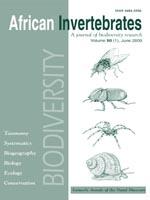Dr Brian Stuckenberg, a distinguished entomologist and Director Emeritus of the Natal Museum, died in February 2009. He was born and grew up in the Eastern Cape, and at a young age his interest in zoology was encouraged by Dr John Pringle, then director of the Port Elizabeth Museum and Snake Park. Brian studied at the Rhodes University, Grahamstown, and obtained with distinction an MSc degree in entomology. In 1953 he was appointed by the Natal Museum in Pietermaritzburg, where Pringle was now Director. In 1972 he was awarded a PhD by the University of Natal, and in 1976 when John Pringle retired, Brian succeeded him as Director.
From the very beginning of his entomological career Brian had decided to specialise in Diptera as he believed this to be the most important group of insects. During his 20 years as head of the Department of Entomology he emerged as the leading dipterist in Africa, and built up the largest collections of Afrotropical flies in the world. His fieldwork and publications were extensive, and so well thought of was he that well over a hundred taxa have been named after him. The quality of his research was given international recognition by the awarding of an honorary membership of the International Congress of Dipterology.
He believed passionately in the educational role of museums, especially in communities where the school system was inadequate, and under his leadership the education department of the Natal Museum became a unit that not only welcomed increasing numbers of children to the museum, but actively took the services of the museum out into the community, and especially to the deprived areas around Pietermaritzburg. In 1990 Brian visited museums in the United States, mainly those that excelled in presenting science and technology to children, and what he saw resulted in innovations and new directions at the Natal Museum.
His editorship of the Annals of the Natal Museum (now African Invertebrates), his active involvement in broad museological issues and the South African Museums Association, and his eighteen years as Director inevitably reduced the time Brian could devote to his research. Nor were the Diptera his only focus of professional interest. The acquisition by the museum of some bronze cannons and other artefacts from the Portuguese ship the Santiago, wrecked in the Mozambique Channel in 1585, led him into marine archaeology and a general study of Portuguese voyages of exploration off the south eastern coast of Africa. In 1998 his paper entitled ‘The location and identity of the Baixos da Judia: Portuguese historical cartography of the Mozambique Channel and its relevance to the wreck of the Santiago in 1585’ was a joint winner of the Almirante Teixera da Mota Prize awarded by the National Maritime Academy of Portugal, and he was further honoured by being elected a member of that body.
That Brian, the entomologist, should successfully undertake historical research is not surprising. His interests were wide-ranging, and he brought to them a remarkable intellectual curiosity. His directorship at the Museum was characterised by his enthusiastic and informed encouragement and support of the work in all its research departments. Anyone, whether museum staff or not, could be sure of his careful interest in any object, idea or problem they brought to his attention. At a gathering of family, friends and colleagues the week after his death, several spoke of their association with him, and a recurring theme was the way in which Brian's personal interest and insight into what they were doing had a significant impact on their lives and careers.
He was a shy man, but realising that his position as Director made him something of a public figure and would require him to speak at various gatherings, he consciously developed his speaking skills. He became an entertaining and sought-after speaker whose diffidence and modesty could hardly conceal the immense authority with which he could speak on a range of topics.
After his retirement in 1994, Brian continued to work at the Museum as Honorary Keeper of Entomology, once more able to devote time to his specialist research and to collaboration with fellow entomologists from around the world. He also continued his close association with the Museum's scholarly journal African Invertebrates as an immaculate author, a thorough reviewer, and an active member of the Editorial Board.
Brian, who will be sorely missed by his many friends and associates, is survived by his wife Pam, two daughters and a son.






